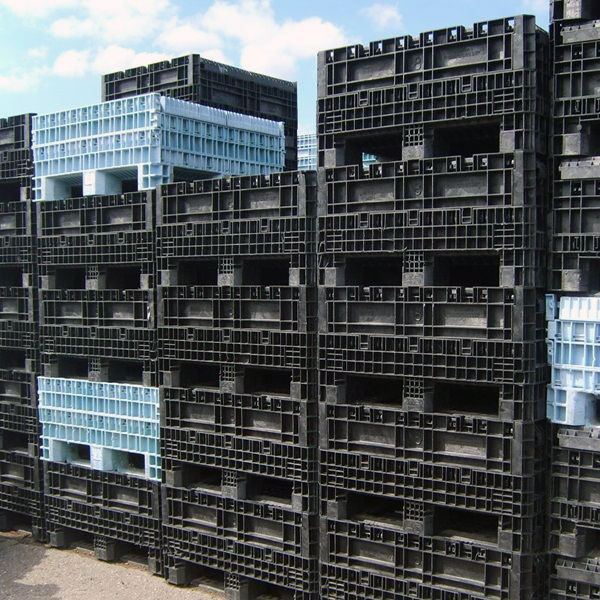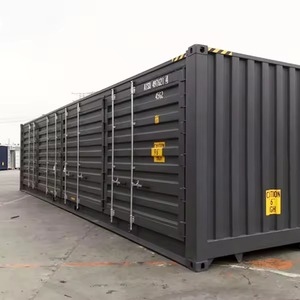Why Bulk Containers Are Vital for Sustainable and Cost-efficient Transport
Mass containers play a crucial role in contemporary logistics. They promote the effective activity of big amounts of goods, thus optimizing transportation procedures. This technique not just minimizes costs however likewise minimizes environmental influence via lower exhausts and waste generation. As markets seek more sustainable practices, the fostering of bulk containers is ending up being progressively considerable. What effects does this shift hold for future logistics and supply chain management?

The Benefits of Utilizing Mass Containers in Logistics
Bulk containers reinvent logistics by enhancing efficiency and sustainability. These containers permit for the transport of big quantities of goods in a single trip, considerably reducing the variety of journeys called for. This not just simplifies operations yet additionally lessens labor expenses associated with handling, packing, and dumping. Furthermore, bulk containers are made to optimize space usage within transportation vehicles, making certain that even more items can be shipped all at once.
The standardization of bulk containers additionally simplifies the logistics process. With consistent measurements, they can be conveniently piled and saved, leading to boosted storage facility monitoring. In addition, mass containers commonly include durable materials that secure materials from damages during transportation, thereby lowering item loss and increasing total reliability. Because of this, services can experience improved supply chain performance, ultimately leading to raised success and client satisfaction. This combination of variables makes mass containers a crucial possession in contemporary logistics.
Environmental Impact: Minimizing Waste and Carbon Impact
As markets increasingly prioritize sustainability, the adoption of mass containers has actually arised as a key technique for minimizing waste and reducing carbon footprints. These containers lessen using packaging materials, such as boxes and plastic, therefore significantly lowering total waste generation. By settling deliveries, mass containers enhance transportation performance, permitting even more items to be delivered per journey. This reduction in trips directly correlates with lower greenhouse gas discharges, adding to a smaller sized carbon impact.
Bulk containers can usually be reused or reused, better minimizing environmental impact. The durability of these containers guarantees they can endure numerous transport cycles, minimizing the demand for single-use choices. used plastic containers. By enhancing logistics and advertising efficient resource use, mass containers not only sustain sustainable techniques but likewise urge markets to line up with global ecological objectives. Inevitably, their application reflects a dedication to environmental stewardship and accountable source monitoring
Price Savings: Exactly How Bulk Containers Lower Transport Costs
While lots of business seek means to enhance their bottom line, making use of bulk containers offers a considerable possibility for reducing transportation costs. Mass containers make the most of the volume of items delivered, permitting companies to ship bigger amounts at the same time. This efficiency decreases the number of trips called for, directly lowering gas expenses and decreasing labor expenses related to loading and unloading.
In addition, bulk containers usually include streamlined layouts that enhance room utilization within transport vehicles. This indicates less voids, resulting in much more reliable use offered capability. The longevity of bulk containers can decrease the threat of product damage throughout transportation, making certain and lowering losses that even more products show up undamaged.
Enhancing Supply Chain Performance With Bulk Storage Solutions
Mass storage solutions play a crucial function in enhancing supply chain effectiveness by maximizing stock management. By settling items into less, bigger containers, organizations can considerably minimize managing prices associated with frequent transfers and processing. This structured technique enables better monitoring and monitoring of stock, inevitably leading to boosted functional efficiency.
Structured Supply Management
Efficient supply monitoring is crucial for optimizing supply chain procedures, especially when organizations adopt bulk storage remedies. These options enable organizations to keep higher supply levels while minimizing the regularity of replenishment. By settling materials right into mass containers, business can enhance their stock processes, decreasing the intricacy associated with tracking multiple smaller sized plans. This approach assists in precise stock counts and boosts projecting accuracy, enabling more enlightened decision-making. Additionally, mass storage space options streamline storehouse organization, making it less complicated to situate and gain access to products when needed. Consequently, organizations can attain a more reliable supply turnover rate, eventually enhancing overall supply chain efficiency and lowering the chance of stockouts or overstock scenarios.

Lowered Handling Prices
The application of bulk storage services not only streamlines stock management but likewise significantly lowers managing costs across the supply chain. By settling materials into bulk containers, companies decrease the demand for constant handling and transfer between various storage space and transport systems. This method reduces labor check here costs related to loading, discharging, and moving smaller packages. Furthermore, bulk storage space decreases the frequency of deliveries, leading to reduced transportation prices and lowered gas consumption. Therefore, businesses can enhance their logistics procedures, enabling a more effective allowance of sources. Eventually, reduced taking care of prices add to improved total supply chain performance, cultivating an environment that supports both sustainability and financial viability.

Adaptability of Bulk Containers Throughout Various Industries
Although numerous sectors have unique requirements for transportation and storage, bulk containers have emerged as a flexible solution that fulfills a large range of needs. These containers, ranging from big bins to specialized tanks, can accommodate diverse products, including fluids, powders, and granules. In the agricultural sector, bulk containers assist in the transportation of grains and plant foods, while the food and beverage market utilizes them for ingredients and completed products. The chemical sector depends on bulk containers for securely delivering unsafe products, making sure compliance with safety and security regulations. Furthermore, building firms benefit from mass containers for transferring accumulations and various other products. Their flexibility encompasses numerous settings of transportation, including vehicles, trains, and ships, improving logistical effectiveness. This versatility not just enhances operations across different fields however additionally promotes sustainability by reducing packaging waste and enhancing room in transportation. Therefore, bulk containers play a vital function in contemporary supply chain administration.
Future Patterns wholesale Container Usage and Sustainability
The future of bulk container use is increasingly shaped by innovative products development that boosts sustainability. Furthermore, automation in logistics promises to improve procedures, reducing waste and improving performance. Welcoming round economic situation practices will additionally reinvent exactly how bulk containers are designed, used, and reused, fostering a much more sustainable transport landscape.
Cutting-edge Materials Advancement
As markets increasingly focus on sustainability, innovative materials advancement in mass containers becomes a considerable variable in improving environment-friendly transport solutions. Makers and researchers are checking out naturally degradable plastics, recycled compounds, and light-weight steels to decrease ecological impact. These products not only reduce waste but also enhance gas efficiency by lowering the overall weight of containers. Additionally, developments in smart materials, which can adapt to differing problems, improve the sturdiness and functionality of mass containers. The integration of these ingenious materials straightens with round economic climate concepts, advertising reuse and recycling. As the need for lasting practices grows, the development of such products will certainly play a vital function in forming the future of bulk container usage in logistics and transport.
Automation in Logistics
Considerable improvements in automation are poised to change logistics and the usage of bulk containers, improving sustainability in transportation. Automated systems, consisting of drones and autonomous vehicles, are improving the motion of mass containers, decreasing the dependence on typical fuel-powered transport. These modern technologies optimize routing and loading procedures, minimizing vacant miles and boosting gas effectiveness. Additionally, automated inventory management systems enhance tracking and surveillance of bulk containers, ensuring far better resource allowance and minimized waste. The integration of the Web of Things (IoT) allows real-time data evaluation, making it possible for aggressive decision-making that aligns with sustainability objectives. As automation continues to develop, it is anticipated to drive further innovations wholesale container usage, inevitably supporting even more sustainable logistics methods and decreasing the environmental effect of transport.
Circular Economic Climate Practices
Advancements in automation are setting the phase for an extra integrated strategy to circular economic situation practices in the domain name of bulk container usage. As markets increasingly embrace sustainability, bulk containers are being created for longevity and reusability. This change not just minimizes waste but additionally boosts resource effectiveness. Firms are adopting methods such as closed-loop systems, where utilized containers are gathered, reconditioned, and reintroduced right into the supply chain. In addition, wise technologies track container life process, helping with much better monitoring and reducing ecological influence. The partnership between manufacturers, logistics service providers, and end-users is important in establishing criteria for lasting container usage. refurbished bulk containers. Future patterns suggest a growing emphasis on products that are recyclable and eco-friendly, more strengthening the round economic situation's concepts wholesale transport

Frequently Asked Inquiries
What Products Are Bulk Containers Normally Made From?
Mass containers are usually built from long lasting products such as high-density polyethylene, cardboard, steel, and light weight aluminum. These products supply convenience, strength, and protection, making them suitable for moving various products in various sectors efficiently.
Just how Do I Pick the Right Size Bulk Container?
Choosing the best dimension bulk container entails evaluating the quantity of products to be carried, thinking about managing tools compatibility, and appraising storage area requirements. Correct dimension assurances performance in transport and reduces waste throughout delivery.
Are Bulk Containers Reusable or Recyclable?
Mass containers are usually reusable, designed for numerous journeys, enhancing sustainability. Numerous can additionally be reused, depending upon the materials utilized. Selecting recyclable alternatives further supports ecological goals and reduces waste in transportation techniques.
What Security Rules Put On Bulk Container Transport?
Safety and security policies for mass container transport consist of conformity with the Division of Transport guidelines, proper labeling of dangerous materials, structural integrity assessments, and adherence to weight restrictions to ensure safe handling and stop crashes during transportation.
How Can Companies Change to Making Use Of Bulk Containers Efficiently?
Services can change to bulk containers by reviewing existing logistics, training team on handling, investing in appropriate tools, optimizing inventory management, and working together with vendors to guarantee compatibility and performance throughout the supply chain.
As markets increasingly focus on sustainability, the fostering of bulk containers has emerged as a key technique for decreasing waste and reducing carbon footprints. By combining materials into bulk containers, firms can enhance their supply processes, decreasing the complexity linked with tracking several smaller bundles. As sectors significantly prioritize sustainability, cutting-edge materials advancement in bulk containers arises as a considerable element in improving eco-friendly transport options. Automated systems, including drones and independent vehicles, are streamlining the movement of bulk containers, minimizing the reliance on conventional fuel-powered transportation. Additionally, automated inventory monitoring systems improve tracking and surveillance of bulk containers, guaranteeing far better resource allowance and lowered waste.